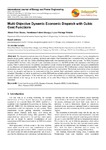Multi Objective Dynamic Economic Dispatch with Cubic Cost Functions

View/
Date
2015Author
Musau, Peter Moses
Abungu, Nicodemus Odero
Wekesa, Cyrus Wabuge
Metadata
Show full item recordAbstract
The formulation and solution of the Dynamic Economic Dispatch (DED) problem is one of the key disciplines in modern power system operation, planning, operation and control. Past researches have considered DED on Quadratic Cost Functions (QCF), with only few works considering higher order cost functions which are more accurate. The Static Economic Dispatch (SED) has been widely tackled in past researches, however, it is the DED problem that represents a real life power system. There is need to review this problem and establish a more practical formulation of the same taking into consideration all the objectives and constraints possible. The methods used in the solution of DED problem have evolved from the traditional deterministic ones, to the pure heuristic, and finally to the state of the heart hybrids. The hybrids methods have been developed to exalt the strengths and improve the weaknesses of the base method. Such optimisation methods need to be reviewed and classified. This paper will do an in depth review of the DED problem on both quadratic and cubic cost functions. Further it will provide a detailed classification of the methods used to solve the problem as its complexity increases. Consequently, three method Hybrids is the way go as far as the solution of the cubic Multi Objective DED (MODED) with five objectives is concerned.
